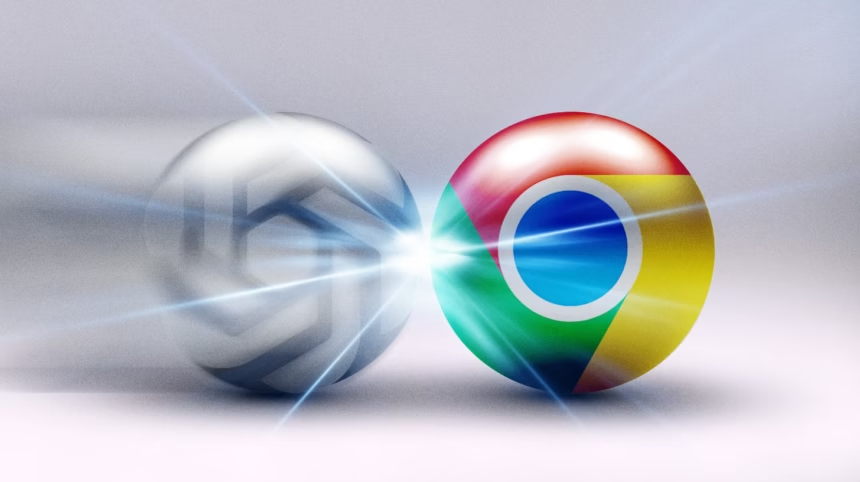At the forefront of the technology world, OpenAI Chrome acquisition debate was transacted in an ongoing antitrust trial with Google. All eyes are focused on the browser dominance closer home to artificial intelligence (AI). Thus regulators and innovators have different visions of what the future has in store for the internet. OpenAI’s surprise acquisition of Google Chrome raises a lot of eyebrows, especially at a time when Google’s search monopoly is being scrutinized.
This newfound willingness to pursue a Chrome acquisition only if regulators forced Alphabet to disinvest, according to OpenAI’s Nick Turley, is at the heart of the antitrust trial. Turley says the aim is to combine the browser dominance of Chrome with OpenAI’s cutting-edge tools of artificial intelligence, e.g., ChatGPT. Such integration has the potential to disrupt the Google search monopoly to give rise to a new paradigm of navigating in the digital space.
Chrome as a Gateway to AI Revolution
This, according to Turley, would boost user experience by enhancing relevance and factual accuracy through combination with AI-inclusive platforms like ChatGPT. The OpenAI Chrome acquisition is not about consumers but about shifting power and paradigms in everyday life vis-a-vis browser dominance and artificial intelligence redefining in everyday life.
Google’s monopoly of search thanks to Chrome’s 64% global market share is seen as the foundation for its Google search monopoly. It became evident in the antitrust trial of certain exclusive deals with device makers that ensured that Chrome and Google’s search would be set as defaults. This methodology has convinced the regulators that innovation is smothered and that competition is affected in both the area of browser dominance and in the realm of artificial intelligence.
AI’s Dependence on Search: OpenAI’s Challenge
This is how litigation moves with the antitrust trial. Turley said, by way of admitting, that ChatGPT has not yet been able to independently respond to more than 80% of the inquiries. Getting to use a tool like Chrome would narrow that gap and further enhance AI-driven results, making the OpenAI Chrome acquisition even more imperative.
Earlier, OpenAI attempted to access the API from Google, but that was turned down, proving the might of the Google search monopoly. This reveals how without even access to the live search data, the best artificial intelligence relies heavily on browser dominance to modern AI competition advancement.
DOJ Targets Chrome to Break Search Monopoly
According to the Department of Justice, the OpenAI Chrome acquisition would remedy the situation by decoupling consumers from the Google search monopoly. They felt that taking Chrome out of Google’s universe would allow an individual to have more rich and diverse choices in both search and associated AI tools.
The DOJ believes that default placement deals enable consumer dominance over the browser, restricting advancement within the artificial intelligence sector. Prosecutors consider that such actions should allow OpenAI chrome to enjoy a fair competitive chance at AI-first searching; thus, freeing Chrome would level the playing field.
Read Another News: Google to Pay Rs 20 Crore into Android TV Market Practices to Settle CCI Probe
Industry Reacts to AI and Browser Shake-Up
With the antitrust trial going this far against the defense, the tech leaders have given tough reactions. The CEO of Perplexity AI says moving Chrome away from Google would hurt user experience, but some say it is the way to go if we want to break the Google search monopoly.
The Chrome acquisition is critical for OpenAI chrome, which would trigger a browsing experience based more on AI. If successful, it would become a viable competitor with Google in browser dominance technologies and facilitate access to live data, which is fundamental for ensuring artificial intelligence accuracy.
Google’s Defense and Future of AI
Google denies wrongdoing and, on the whole, insists it competes against larger entities such as Microsoft and Meta. It is opposing in the antitrust trial case against the DOJ usurpation of its decision to use AI and the browser to service user needs rather than the determinations made by the courts.
Google’s tactics have cemented its supremacy in the browser market, including paying manufacturers to secure the default position. Critics, nonetheless, say such supremacy further allows Google to maintain the monopoly on search to the detriment of innovations in artificial intelligence.
AI, Browsers, and the Future of Tech
The war over Chrome between OpenAI and Google is about more than just browsers: it’s about monopolizing the future of artificial intelligence and online searching. Should the OpenAI Chrome acquisition go through, it could herald a brand-new world where AI makes browsing decisions for us.
As the antitrust trial progresses, the world will be watching to see whether regulators take action to help loosen Google’s reign, thereby allowing room for rising players like OpenAI chrome to shine. In doing so, they would be redefining browser dominance in AI and search through an act.”
For More Trending Business News, Follow Us 10xtimes News






